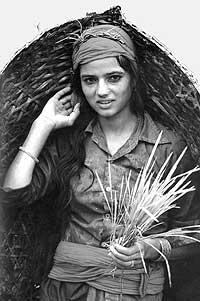 Feminist thinkers are divided over whether or not men and women are essentially different. The physical differences between them are obvious, as are the differences in culturally constructed gender identities. But are their experiences so divergent as to make them unlike each other at the most basic level?
Feminist thinkers are divided over whether or not men and women are essentially different. The physical differences between them are obvious, as are the differences in culturally constructed gender identities. But are their experiences so divergent as to make them unlike each other at the most basic level? Susmita Nepal's poems might answer both yes and no. Her poems suggest that though suffering is universal, the texture of women's suffering is uniquely feminine. And the feel of a Nepali woman's suffering is unique unto Nepal. In the first poem translated below, Nepal explores the sacrifice of women's identities to the demands of household chores.
RICE GRAINS OF WORDS
Picking stones out of rice grains of words
she prepares a meal of experience
Time peers from the gas stove
Setting pots of emotion on the stove
stirring word rice with a pen
she prepares a meal of experience
Each morning spills onto her face
Each evening squeezes her expression
Placing these sights onto the plates of her eyes
she serves a meal of experience
The bangles of torment tinkle and chime
Hungry stomachs rumble
She continues serving meals of experience
and as she serves, she serves up herself
In this second poem, below, Nepal sharpens her fine metaphorical language to express the hopes and disappointments of a rural mother.
MOTHER
Mother cuts each morning
with the edge of a sickle
With all her strength she bundles life
into a heap of grass
then lays it down
before the hunger of cattle
While milking cows,
in each stream she sees
the white teeth of laughing children
She is puzzled by the way pots and plates
stare at herself, ablaze at the stove
Sorrows appear before her
and dance rhythmically
She just gazes at them
Unspoken words she gathers
for her unmarried daughter
She wants to hide the rising moon
in the folds of her clothes -
a snack to erase her hunger
sharpened by loneliness
Memories of her son gone abroad
become a thousand days and vanish
Each time, Mother plants seeds of hope
in the folds of forty year-old scarcity
But these seeds never grow
It can't be said when he'll return
to fix the broken dam in her heart -
her son gone abroad
The third poem is focused on widowhood as experienced by a young Hindu woman.
THE TEEJ FESTIVAL
The Teej festival
is crying
from the fork in the branches
of sorrow's tree
Adorned red in every object, this festival
is now encased in widow's whites
The festival which shares parcels of affection
has now lost itself
in the loose black tresses of widowhood
It is seeking the company of loved ones
It is forced to remain by itself
Sighs are gathering into a muddy flood
The mind is seeking selfhood
asking for my lover's eyelashes
to take rest on those lashes
to fall sleep on those lashes
where wrathful dreams won't chase after me
Watching me now, the Teej festival
sits quietly
becoming sorrowful at my sorrow
staring silently at my helplessness
It can neither say
deck yourself in red
nor can it make
widow's whites accept me
From the tree standing tall at this divide
the Teej festival
is hurting
in each root
branch
leaf
In these and other poems focusing on women's experience, Susmita Nepal examines, with great care and compassion, the kinds of joys and sorrows that comprise Nepali womanhood. Nepal is also a prose writer, and the author of two novels.s


